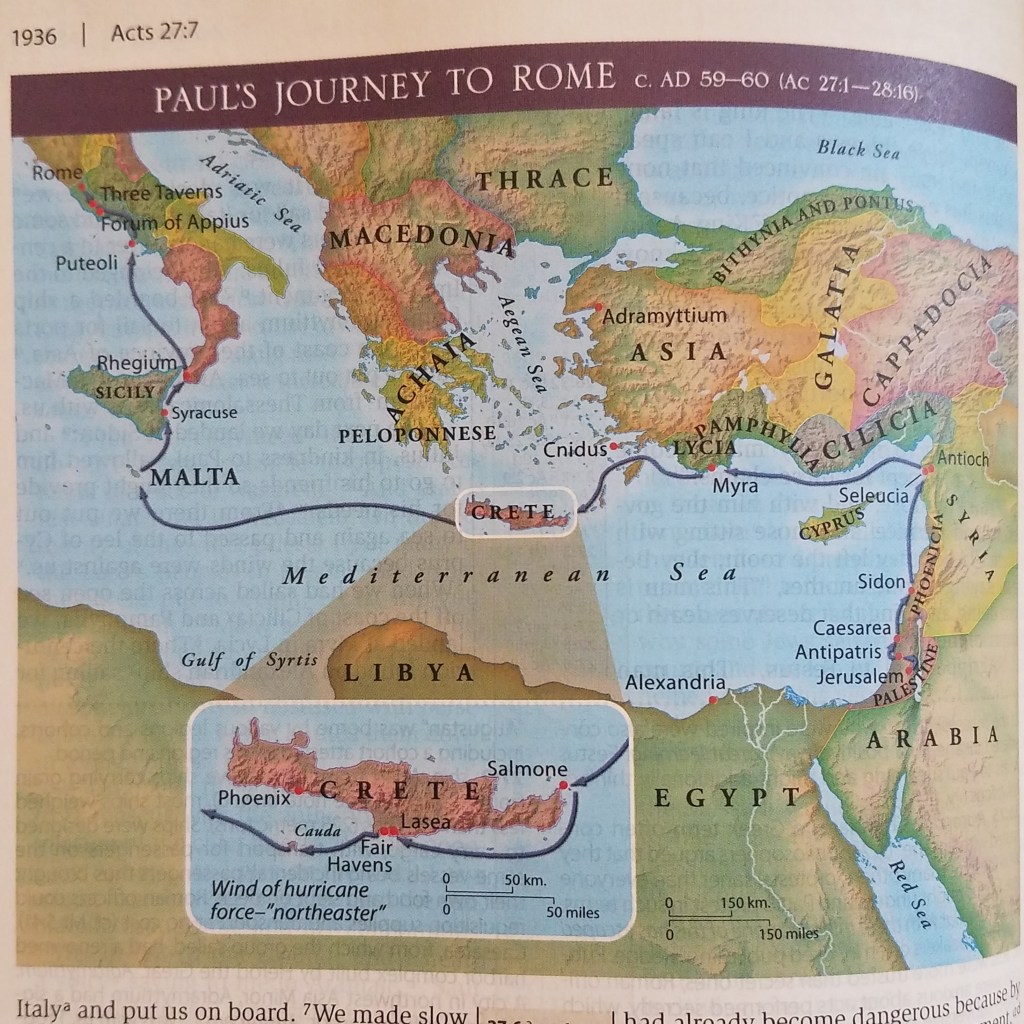Here’s a closer look at the maps!


OUTLINE:
Genre:
- Letter: sometimes referred to as Epistles
- Written in response to a specific need or circumstance.
Context:
- Author: Written by Paul (with Timothy- his disciple)
- Around 61 AD; about 30 years after Christ’s death; original generation still alive
- One of 4 letters written while Paul is in prison in Rome
- What Philippi was like: real people; real time
- Philippi was a prosperous Roman city; not a small rural area
- Along the Egnatian Way, which was a major highway that connected the eastern provinces to Rome (major highway)- big factor in its prosperity and political influence
- Original audience:
- The Christians in Philippi;
- not one church; lots of small churches within the city
- Paul and his team started the church of Philippi during his 2nd missionary journey. First church established in Europe. Luke (as in the gospel of Luke) was its pastor for the first 6 years. One of the healthiest churches in the New Testament.
- The Christians in Philippi;
- What was going on?
- They had sent their member, Epaphroditus, with a gift to deliver to Paul. Paul wrote the letter to thank them for their support/encouragement while he’s imprisoned.
- Paul was also concerned about coming persecutions and the members not all getting along→ written to instruct them to work together
- The Christians in Philippi all loved Paul, but were not getting along with each other
- Bonus: Read Acts, chapter 16, for some of the historical accounts in the Epistles
Observe: What’s Happening?– What is the text saying?
- Paul is so thankful for their faith in Jesus; begins his letter with encouragement and affection
- Vs 6- “being confident of this, that he who began a good work in you will carry it on to completion”- God keeps working on us
- Vs 9- “this is my prayer: that your love may abound more and more in knowledge and depth of insight…may be able to discern”- continues this idea of God working on us
- Vs 12- “what has happened” (see Acts)- he’s in prison
- All through the palace guard (entire palace); it has helped to advance the gospel (perspect changes interpretation of circumstances)
- Vs 13- likely refers to the Praetorian Guard around Rome (Acts 28:16)
- 15- Common in the Meditarranean culture to desire honor
- Vs 18- what matters is that Christ is preached
- Vs 19- Job 13:16
- If he lives, he gets to continue sharing the gospel; if Paul dies, he gets to be with Jesus
- No matter what happens, conduct yourselves in a manner worthy of Christ
- Stand firm in one spirit, one man for the faith
Interpret: What does it mean? What is the central lesson the author wanted to communicate? What does it teach us about God?
- Idea of continued sanctification:
- Definition: the action or process of making something holy; the action or process of being freed from sin
- Becoming more like Christ
- Verse 6- “will carry it to completion until the day of Christ.”
- vs 9/10- “more in knowledge…to discern….until the day of Christ”
- Vs 11- “Filled with the fruit of righteousness that comes through Jesus Christ”
- Perspective:
- Don’t be discouraged with my being in chains
- Paul could be grumbling about being in prison; instead he’s praising God about his ability to share the gospel bc of his unique position there
- He doesn’t get upset that some are preaching from selfish motives; either way Christ is being preached!
- Vs 18- “Yes and I will continue to rejoice!”
- Death vs life- serve here and preach Christ or be with Christ in heaven
- Paul affirms their relationship and his care for them
- begins with sincere thanks, encouragement, and affection;
- almost as if to make it clear that any rebuke is coming from someone who genuinely loves them
- Whatever happens…conduct yourselves in a manner worthy of Christ
- He’s talking about whether he lives or dies and the coming persecution
- Stand firm in one spirit
Application: What does it mean for you? Personal application
- What emotions does the word sanctification bring up in you? Positive/negative/confused? Does that idea that Jesus continues to work in us after being saved intimidate your or give you hope? Are there any areas God is working on in your life now?
- What do you think about Paul’s perspective in the midst of really difficult circumstances? Are there any areas in your life where you could use some new perspective?
- At the end of Chapter 1, Paul is just getting started with some of his rebuke to the Philippians. Knowing Paul gave these warnings from a place of love, how does it make you feel? Regardless of circumstances or persecution, do you feel the body of Christ is standing firm in one spirit? The body of Christ begins with us. Are you conducting yourself in a manner worthy of Christ in our volatile cultural climate?
- Did anything else speak to you from the reading?


Thank you for putting all the work into doing this!! Its just what I’ve been needing.
Some thoughts I had…
The Gospel is so counter-cultural. And Paul often flips the ideas of the times and the thoughts of the church on their heads as he seeks to help them know and understand the true Gospel. I love that Paul flips it and changes the perspective so that they people can better have an eternal understanding as opposed to a temporal one. This always challenges me because I am often overwhelmed by the events of the times and it is so hard to look at things from God’s perspective and not get hung up on our current cultural issues. God also did not come to fix our culture, he came to redeem our souls and THAT is something I need to reflect on.
LikeLiked by 1 person
Thanks Kimber! I love your perspective! It’s so true. God’s way has always been counter-cultural, from the days of the Israelites, to the New Testament period, all the way until now. We’re called to be a people set apart, to reflect the Holy One we serve. 🙂
LikeLike